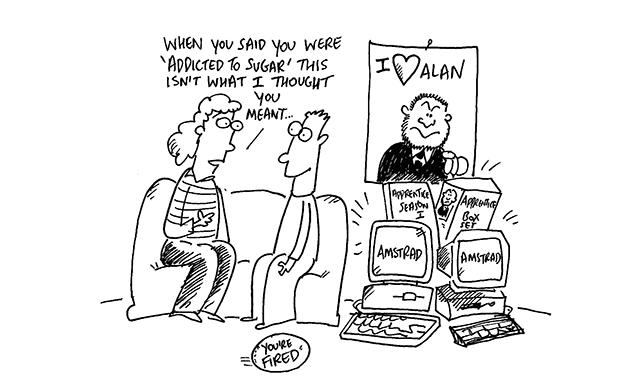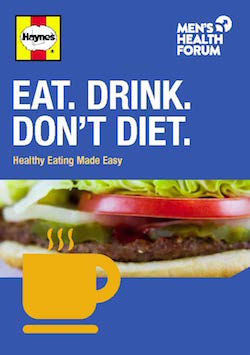Sugar and salt made simple

Is sugar addictive?
Carbohydrates affect mood by triggering the release of feel-good brain chemicals such as serotonin. This can make you crave similar foods but these effects are not as addictive as nicotine or, for some people, alcohol. The craving we often have after a meal for something sweet will pass.
Scientists have also found stress hormone receptors within the taste buds that detect sweetness which may explain why we turn to sweet foods when stressed.
If you crave something sweet, distract yourself. Exercise will do this best - a walk or run - as it will burn off the effects of stress and also curb the cravings - but anything that keeps you absorbed will help. If you can’t get away, drink water or herbal tea.
Does sugar cause a beer gut?
Well, calories do. And the way men store fat around their bellies. It’s not just alcohol. Sugary drinks can do the same. Alcohol and sugar contain stacks of calories and are often consumed when you are not hungry and so don’t need them.
Alcohol contains 7 calories per gram, compared to around 4 calories per gram for carbohydrates, such as sugar, and proteins such as those found in lean meat and beans. Only fats and oils are more energy-dense than alcohol at 9 calories of energy per gram.
How much sugar should I eat?
Free sugar should be no more than 5% of your daily calories (but aim lower.)
Free sugar is essentially the sugars you have some control over. It includes sugar in manufactured or processed food plus sugar or honey you add to food but excludes sugar found naturally in fruit, veg and dairy. So sugar in an apple doesn’t count but sugar in apple juice does (since juice is processed).
New official advice on sugar was published in July 2015: check out our How Much Sugar FAQs. In a nutshell, check food labels and go very easy on sugar you add yourself.
What about salt?
A lot of salt is hidden in processed foods, so check labels:
- 0.3g (per 100g) of salt or less is a LITTLE salt
- 1.5g (per 100g) of salt or more is a LOT of salt.
Should I add salt to my food?
No. Some of us cannot process excess salt (sodium chloride) through our kidneys, leading to a rise in blood pressure.
Aim to eat less than 6g salt per day, which for most men means cutting back. Go easy with salted nuts, crisps, soy sauce and meat or vegetable extract spreads and instead of adding salt to meals, try black pepper, herbs and/or garlic. Or a little low-sodium salt.
We don't currently post comments online but are always keen to hear your feedback.
| This content is wholly based on the Men's Health Forum's man manual Eat. Drink. Don't Diet. which was prepared in line with the NHS England Information Standard of which the MHF is a member. Follow the links for more information or to buy copies. |
Date published
18/06/15
Date of last review
28/02/15
Date of next review
28/02/18
|
The Men’s Health Forum need your support It’s tough for men to ask for help but if you don’t ask when you need it, things generally only get worse. So we’re asking. In the UK, one man in five dies before the age of 65. If we had health policies and services that better reflected the needs of the whole population, it might not be like that. But it is. Policies and services and indeed men have been like this for a long time and they don’t change overnight just because we want them to. It’s true that the UK’s men don’t have it bad compared to some other groups. We’re not asking you to ‘feel sorry’ for men or put them first. We’re talking here about something more complicated, something that falls outside the traditional charity fund-raising model of ‘doing something for those less fortunate than ourselves’. That model raises money but it seldom changes much. We’re talking about changing the way we look at the world. There is nothing inevitable about premature male death. Services accessible to all, a population better informed. These would benefit everyone - rich and poor, young and old, male and female - and that’s what we’re campaigning for. We’re not asking you to look at images of pity, we’re just asking you to look around at the society you live in, at the men you know and at the families with sons, fathers and grandads missing. Here’s our fund-raising page - please chip in if you can. |



